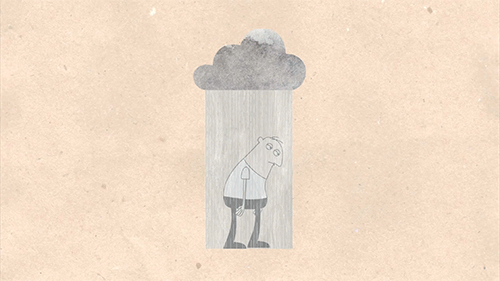TED-ED Clubs asks: How do you talk about depression?
By Adora Svitak on September 10, 2015 in TED-Ed Clubs

I grew up in love with stories. There were days when I’d refuse to go outside or come to dinner because I had my nose in a book, or was trying to write one. My earliest dreams and aspirations came from the characters I read about. But I only thought about their strengths and not about their weaknesses. So when I started presenting at local schools about reading and writing, I built an impossible definition of the character I should play. I wanted to be the “good teacher” — knowledgeable, eloquent and invulnerable. I thought this was the only way to be inspiring.
Be perfect, I told myself while spinning stories on a beat-up laptop with eager elementary school students, because everyone’s watching.
This desire was ironic because I told those students time after time, “Make your characters three-dimensional. Give them strengths and weaknesses.” Yet the very flaws I asked students to make transparent in the pages they wrote, I tried to hide in my own character.
After my TED Talk, I turned 13. I got to hear words like “You’re an inspiration” and “I look up to you.” I traveled to Mexico, France, Switzerland, India, and Sri Lanka — over the course of two months — just for speaking engagements. By anyone’s standards, I was on top of the world. Yet in less than two years, I had filled two journals. Almost every entry started with the words, “I feel sad today.”
It was only after this long sadness had ebbed, passing with an uncharacteristic gentleness, that I felt like I could tell anyone else. I turned 14, and I confessed — about the crying, the journaling, the emptiness — to my best friend.
“Why didn’t you say anything before?” she asked, aghast. A part of me was surprised, as if I had expected a reprimand for a different thing — for having the long sadness, not for staying silent.
I resolved not to stay silent anymore. I turned 15, and I slowly expanded the number of people that I told about who I was when cameras were off and my door was closed. I started writing about small failings and insecurities on my blog. One post — about my poor performance on the SAT’s math section — earned me a then-boyfriend’s horror, a summer of precalc tutoring — and an outpouring of support from friends. Friends shared my post out on their Facebook walls and added their own stories of less-than-stellar academic performance. “None of us have it all figured out,” I wrote in that blog post, adding, “You’re not alone. You never have been.”
Around the world, we’ve seen a number of TED-Ed Club members share their own stories about depression and difficult times.
If you’re working on a TED-Ed Club talk about depression, below are some helpful links on the topic:
- World Suicide Prevention Day is September 10. Read suicide prevention tips for kids and teens, watch Kevin Briggs’ TED Talk: The bridge between suicide and life, learn the warning signs and explore the link to depression. The National Suicide Prevention Hotline is 1-800-273-TALK.
- What is depression exactly, and what are some causes and solutions? Find a general overview of the scientific and social elements of depression on ASAP Science and Crash Course, watch Andrew Solomon’s TED Talk: Depression, the secret we share, and take the TED-Ed Lesson: A brief history of melancholy.
- If you’re interested in the biological and public health side of mood disorders, you can research symptoms and prevalence of depression (and find comprehensive mental health statistics) using information from the National Institutes of Health. If you’re interested in how to practice emotional first aid, read this short TED article.
- The British actor and comedian Stephen Fry wrote of depression, “It’s not all bad. Heightened self-consciousness, apartness, an inability to join in, physical shame and self-loathing—they are not all bad. Those devils have been my angels. Without them I would never have disappeared into language, literature, the mind, laughter and all the mad intensities that made and unmade me.” You can explore the link between depression and creativity in this New York Times piece, “Depression’s Upside.”
- To see two students’ powerful testaments of personal experiences with depression, watch slam poetry performances like “Explaining My Depression to My Mother” and “Living With Depression.”
Whether you choose to speak about depression on the societal, personal or even molecular level, know that you are shedding light on an important topic when you present your ideas to others with confidence. Courage is contagious, and building a society that is more open and less judgmental begins when you start speaking up.
More than 10,000 students are now sharing and presenting their ideas in TED-Ed Clubs around the world. Interested in starting a TED-Ed Club at your school? Find out more.
Tags: Clubs, Depression